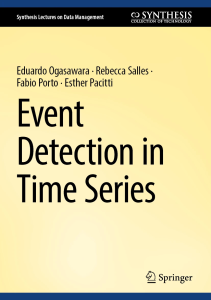 📘 This book is dedicated to exploring and explaining event detection in time series databases. The focus is on events, which are ubiquitous in time series applications where significant behavioral changes occur at specific points or over certain time intervals. Event detection is a fundamental function in surveillance and monitoring systems and has been widely studied over the years. However, this book provides a unified view of the main types of events in time series that every researcher should be familiar with: anomalies, change points, and motifs.
📘 This book is dedicated to exploring and explaining event detection in time series databases. The focus is on events, which are ubiquitous in time series applications where significant behavioral changes occur at specific points or over certain time intervals. Event detection is a fundamental function in surveillance and monitoring systems and has been widely studied over the years. However, this book provides a unified view of the main types of events in time series that every researcher should be familiar with: anomalies, change points, and motifs.
The book begins with fundamental concepts on time series and presents a general taxonomy for event detection, which includes:
(i) event granularity (point, contextual, and collective);
(ii) general strategies (regression, classification, clustering, and model-based methods);
(iii) methodological approaches (theory-driven and data-driven);
(iv) types of machine learning (supervised, semi-supervised, and unsupervised); and
(v) data management (ETL process).
This taxonomy is explored throughout the chapters dedicated to each specific type of event — anomaly detection, change point detection, and motif discovery. The book also discusses advanced evaluation metrics for event detection methods and includes a chapter on online event detection, addressing major challenges and strategies (static versus dynamic), including incremental and adaptive learning.
💡 All examples and figures presented in the book are available in the GitHub repository:
👉 https://github.com/eogasawara/TSED
There, readers can explore the complementary materials, suggest new topics for future editions, and report any issues identified in the book.
This book is intended for undergraduate and graduate students from various fields who have an introductory background in data science or data analysis.
Authors: Eduardo Ogasawara, Rebecca Salles, Fabio Porto, Esther Pacitti
📖 Available at Springer: https://doi.org/10.1007/978-3-031-75941-3